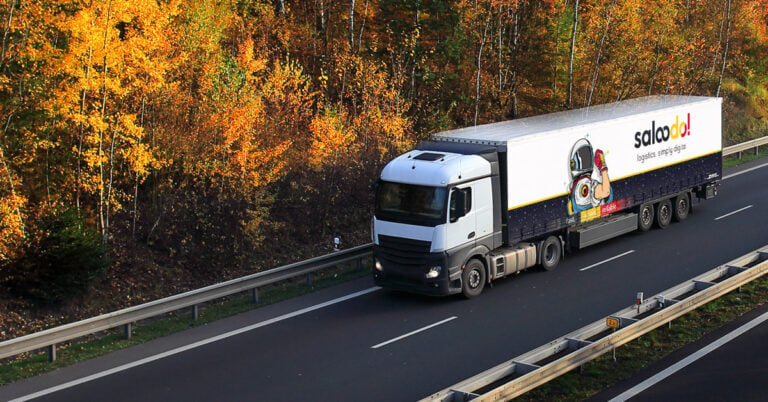E-commerce records stable growth
The e-commerce market has seen tremendous growth in recent years and it is impossible to imagine today without it. Global e-commerce sales are growing at an annual rate of 11.16% (CAGR 2023-2027). According to statista, e-commerce sales in Germany will amount to approximately €147 billion in 2023. According to the forecast, a market volume of €201 billion will be reached in 2027. With these growth rates, it is of great importance for e-commerce companies to find a reliable and efficient transport solution to deliver their products quickly and safely to their customers.
How digital logistics platforms support e-commerce
Digital logistics platforms provide access to a wide range of carriers and transportation options, so businesses can always find the best solution for their shipments. By automating processes and providing a user-friendly interface, companies can manage their shipments with ease. In addition, digital logistics platforms offer transparent pricing and greater control over the transportation process. Companies can use the platform to create transport orders, compare quotes from different carriers, and monitor the transport process.
The 5 biggest benefits for e-commerce businesses
- Cost savings: By using digital logistics platforms, e-commerce companies can reduce shipping costs and benefit from transparent pricing.
- Increased efficiency: Automated processes and a user-friendly interface enable faster and easier management of shipments.
- Flexibility: Digital logistics platforms provide access to a wide range of carriers and transportation options, so companies can always find the best solution for their shipments.
- Scalability: e-commerce businesses can adjust and scale their transportation volumes as needed without increasing administrative overhead.
- Reliability: Digital logistics platforms provide greater visibility and control over the transportation process, which can lead to higher reliability and customer satisfaction.
Saloodo! pioneer in sustainability in e-commerce
As an innovative, digital freight platform for road haulage, Saloodo! strives to promote sustainability. By connecting companies with a variety of freight forwarders, empty runs can be avoided and transport capacities can be used more efficiently. By bundling and optimizing their transport orders via Saloodo!, companies make road freight transport more efficient and environmentally friendly overall.
“As an innovative, digital freight platform for road haulage, sustainability is an important pillar of Saloodo! After all, using our platform inherently ensures better truck utilization,” explains Dr. Antje Huber, CEO of Saloodo! “Our goal is to reduce unnecessary empty runs and make transports more efficient. We have a clear vision on this topic: make your customers more profitable and act more environmentally friendly at the same time. We are therefore very happy about how many of our customers are already committed to sustainability and environmental protection.”
Paperless processing is another aspect of sustainability that Saloodo! supports. Through the digital freight exchange, transport orders, documents and communication can be handled electronically. This eliminates the need for paper documents such as transportation contracts, invoices, and other shipping documents. Paperless processing not only reduces the consumption of resources such as paper, but also the associated energy consumption and waste.
An overview of logistics freight options in e-commerce
Now that we’ve highlighted the benefits of digital logistics platforms for e-commerce businesses, let’s take a look at the different logistics freight options available to you to ship your products efficiently and cost-effectively.
LTL (Less than Truckload) is a freight option that is ideal for smaller ecommerce shipments. With LTL, individual packages or pallets that take up to 5 pallet spaces are loaded through a HUB system of terminals. The intelligent consolidation of shipments saves both costs and time.
LTL (Less than Truckload) is a freight option ideal for smaller e-commerce shipments. With LTL, individual packages or pallets that take up to 5 pallet spaces are loaded via a HUB system of terminals. The intelligent consolidation of shipments saves both costs and time.
PTL (Partial Truckload Partial) truckload shipping of 6 to 14 pallet spaces or more is a freight option in which shipments are transported primarily in direct traffic. These shipments can be combined by additional partial truckloads, resulting in schedulability and a reduction in empty freight space for carriers. Efficient use of available freight space can reduce costs and make the best use of resources.
FTL (Full Truckload) refers to a freight option in which the customer books the entire cargo space of the truck. With this so-called full truckload – depending on the size of the truck – there are usually 13.6 loading meters and a permissible transport weight of 24 tons available. Through optimal placement, it is possible to place up to 34 pallets on the truck. In this case, the transport takes place without reloading in direct traffic. This option enables maximum utilization of the truck loading space and efficient delivery of large quantities of goods without intermediate stops.
For larger e-commerce companies that rely on timeliness and efficiency, FTL is undoubtedly the preferred shipping option. It allows large volumes of goods to be shipped without compromising speed or safety.
For more help finding the right logistics solution, the sales team at Saloodo! is happy to help.









